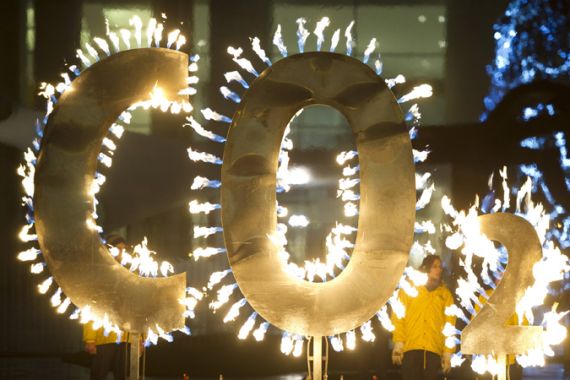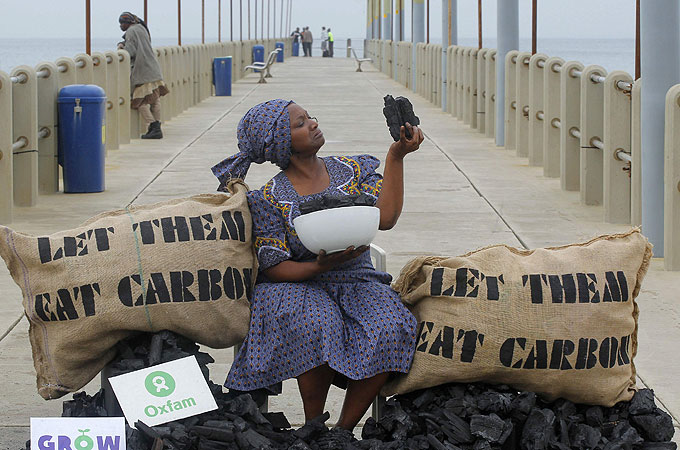UN climate talks scramble to reach a deal
Durban conference extended as 194 nations try to reach a deal on how to deal with global warming over the coming decade.

 |
| Environmentalists have been campaigning in Durban to press for an agreement [Reuters] |
UN climate talks have been extended as environment ministers haggle over proposals for a new pact to roll back the threat from greenhouse gases.
Negotiations entered an unscheduled 13th day in South Africa on Saturday after all-night wrangling over the text of a possible agreement.
Keep reading
list of 4 itemsAfter the Hurricane
World’s coral reefs face global bleaching crisis
Why is Germany maintaining economic ties with China?
“The concern now is that time is extremely short,” said European Union Climate Commissioner Connie Hedegaard, spearheading the drive for a legally binding accord by 2015 covering the world’s major carbon polluters.
Earlier drafts at the meeting said negotiations should not begin until 2015, and should not take effect until 2020.
“We still have a lot of text that is not there. It is very difficult to discuss one piece without the other, because in the end the things are interconnected,” said Hedegaard.
Maite Nkoana-Mashabane, the South African foreign minister, suspended talks late on Friday after a coalition of island
nations, developing states and the EU objected to a text that they said lacked ambition.
It was then agreed that talks would continue into Saturday.
The EU has been rallying support for its plan to set a date of 2015 at the latest for a new climate deal that would impose binding cuts on the world’s biggest emitters of heat-trapping gases.
Any deal could then come into force up to five years later.
Legal responsibility
The crux of the dispute among the 194 nations is how binding the legal wording in the final document will be. The initial draft spoke of a “legal framework”, which critics said committed parties to nothing.
The new draft changed the language to “legal instrument”, which implies a more binding commitment, and says a working group should draw up a cuts regime by 2015.
It also turns up pressure on countries to act more quickly to come up with emission cut plans.
A vital clause of the non-binding Kyoto Protocol mandating carbon cuts expires at the end of 2012.
While the EU has said it is open to signing an updated protocol, it wants assurances that the world’s biggest emitters will sign too.
Al Jazeera’s Jonah Hull, reporting from Durban, said countries are “stuck” in their discussions on whether or not to hold future talks on an updated protocol.
“At this point there are two groups very split,” he said.
“On the one side an unlikely alliance between the US, Brazil, India and China – for different reasons resisting the idea of those talks and a future deal, on the other side the EU and just about everyone else wants to get them off the ground as soon as possible.”
China, India and the US together account for about half of the world’s carbon emissions.
Financing concerns
Rich countries have pledged up to $100bn a year by 2020 to aid poor states most directly affected by rising global temperatures to adapt their economies and protect themselves from adverse weather.
Critics, howeer, said it could remain a hollow promise unless there was also agreement on where the actual funds came from and how the money was spent.
The US has haggled over the source of long-term financing and how to measure the needs of poorer countries.
When asked how much money could be available, US envoy Todd Stern said most donor countries were waiting for the fund to get up and running before making contributions.
Stern also rejected the accusation that Washington wanted to delay discussions on emission cuts until after 2020.
“It’s nonsense to suggest that what we are doing is proposing a kind of hiatus in dealing with climate change until after 2020,” Stern told reporters, adding that the US supported a “process” for a future agreement.
China has said that it wants the fund set up before it would make its domestic climate efforts binding under an international agreement from 2020.
Other important developing countries also wanted the fund’s design agreed to in Durban. If a fund is agreed, its impact may not be felt for many years.
“Even if the fund is established this week, then practical realities will likely limit its impact for a number of years,” Nick Robins, climate change analyst at HSBC, explained.
“It will take at least 12 months to set up and the appraisal process means it will probably not be spending until 2015.”